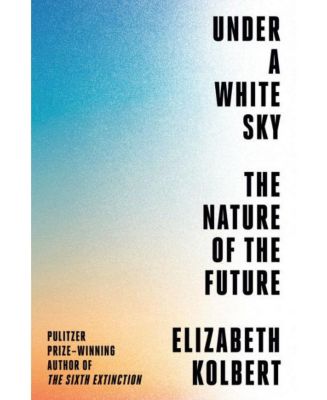Product details
Web ID: 12622575Seeking Solutions for Global Planetary Survival
Seeking Solutions for our Global Planetary Survival “A fine mess you’ve made. Now what are you going to do to clean it up?” How many times have you heard those words, or some variation of them? Annoying, yes, but uncomfortably accurate, I bet. And that’s the question Elizabeth Kolbert investigates in her new 2021 “Under a White Sky: The Nature of the Future” sequel to her 2014 Pulitzer Prize winning “The Sixth Extinction: An Unnatural History” about how we affect our environment. Kolbert’s new work reflects a shift from her earlier effort to point out with alarm the environmental and other species impacts of human actions made in the name of “progress”. Things have changed for her since then and there is no going back. Quoting Stewart Brand, editor of the Whole Earth Catalog, “We are gods and might as well get good at it”, the author also includes his Revive & Restore group mission “to enhance biodiversity through new techniques of genetic rescue”. And she adds: ”Rejecting such (new) technologies as unnatural isn’t going to bring nature back. The choice is not between what was and what is, but between what is and what will be, which, often enough, is nothing.” This response is shaped by the historic and continuing impact of human globalization experience such as circulating pathogens from one part of the planet to another with unexpected consequences, e.g. American chestnut tree blight. Kolbert sprinkles in unexpected humor throughout her narrative. During a trip to Nevada to observe conservation efforts to save small fish somehow surviving under extreme desert conditions, she drily notes upon returning to her hotel: “I really wanted a drink. But I couldn’t bring myself to go back down to the lobby…to find a faux French bar. I thought of the Devil’s Hole pupfish in their simulated cavern. I wondered: Is this how they felt in their darker moments?” The book is divided into three sections covering different environmental challenges: • “Down the River”: two chapters looking at different American challenges at controlling invasive carp species near Chicago and relentless Mississippi River challenges in the Delta • “Into the Wild”: three chapters examining different survival challenges for the aforementioned pupfish in Nevada, “assisted evolution” efforts to save corals around Hawaii and Australian Great Barrier Reef, and unexpected results from importing and releasing cane toads to solve a sugar cane grub problem into the Australian Outback • “Up in the Air”: three chapters discussing more measures, some unusual and wildly imaginative, being considered by different international groups to control and stabilize CO2 emissions, climate change and the source of the book’s distinctive title “Under a White Sky” Throughout the narrative journey various recent technologies are discussed, particularly CRISPR (clustered regularly interspaced short palindromic repeats – yes, I wondered about that acronym, too), solar radiation management, SAILS (Stratospheric, Aerosol Injection Lofter – this one you have to read for yourself). The author includes some tasty historical tidbits: the impact of early agriculture, Darwin’s musings about the variety and creativity of nature, and an entertaining, mind-blowing section about Camp Century, a Cold War effort by Americans to develop forward military monitoring bases in Greenland with overlooked challenges and impacts on base life. Kolbert does a great job of presenting not just the big picture but getting into the details. Her quote from “The Leopard” (1958 by Giuseppe Tomasi di Lampedusa) sums up our present situation, for better or worse: “If we want everything to remain as it is, everything must change.”
Customer review from barnesandnoble.com


Excellent Book on Human Impact on Nature
Excellent book on examples of problems to humans and nature created by trying to improve on nature. Unfortunately, projects to solve problems sometimes create unforeseen new larger problems. Long term planning and vision is needed before major changes to nature are made.
Recommends this product
Customer review from barnesandnoble.com